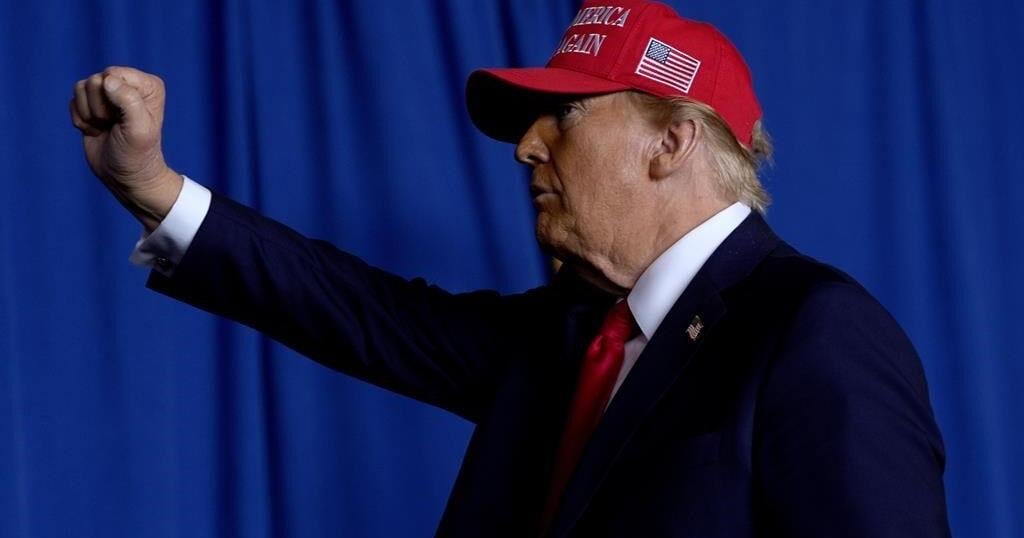WASHINGTON – A new report from the Canadian Chamber of Commerce is sending a stark warning ahead of the U.S. presidential election, saying protectionist policies like Donald Trump’s proposed tariffs could damage economies on both sides of the border.
The report authored by Trevor Tombe, an economics professor at the University of Calgary, said while most Canadians recognize the importance of trade with the U.S., Americans don’t have the same understanding about how intricately the two countries are connected particularly at a time of geopolitical uncertainty.
Canadian officials and business groups have been meeting with Democratic and Republican counterparts across the U.S., making sure Canada is prepared for any outcome of the November election.
Both presidential candidates have campaigned on protectionist policies that could cause uncertainty for Canadian trade. Whoever takes the White House will be in charge during the review of the Canada-U.S.-Mexico agreement in 2026.
“Both parties have moved in protectionist directions for some time,” Tombe said.
While Vice-President Kamala Harris is expected to stay close to the Biden administration’s path on relations with Canada, last month she highlighted her opposition to the NAFTA replacement that was negotiated under the Trump administration, saying it allowed major auto companies to outsource American jobs.
Meanwhile, Trump has signalled his plans to impose a 10 per cent across-the-board tariff on imports if he gets a second term.
That proposal caused concern on both sides of the border.
Kirsten Hillman, Canada’s ambassador to the U.S., has tried to appease fears by saying that Washington would likely not find it feasible to apply the tariffs in Canada’s case.
If Trump’s tariffs were enacted, Tombe said it would harm economies on both sides of the international border.
The report, which used models to estimate the impact of the tariffs if they become permanent, suggested the move would reduce the size of the Canadian economy between 0.9 and one per cent, resulting in around $30 billion per year in economic costs.
The report estimates the U.S. would see around US$125 billion a year in economic costs.
Things would be even worse if other countries retaliated with tariff walls of their own. In that case, Canadian incomes would fall by 1.5 per cent and productivity by 1.6 per cent, the report said.
“That’s, right there, $45 billion in lost economic activity in Canada,” Tombe said. “Roughly speaking, that’s about half the size of your normal recession. That’s a pretty big hit.”
It’s not the first time such a policy has been put forward in the U.S.
Tombe pointed to the 1971 “Nixon Shock,” when the U.S. levied a temporary 10 per cent surcharge on imports, including from Canada.
Then, as now, Canada sought an exemption, citing its unique and integral role as a reliable trade partner.
Nixon’s tariff lasted only four months before it was reversed, but research has found it resulted in a 2.6 per cent reduction in total imports into the U.S. from Canada.
The effect would likely be greater today, Tombe said, because the nature of trade between the two countries has become more complex and connected.
Some experts have warned the relationship between the two countries shifted from being strategic to transactional as Canada became less critical compared with other places in the world.
The new report said the Canada-U.S. economic relationship is massive, deeply interconnected and mutually beneficial.
It is made of “a complex web of supply chains across many sectors,” the report said, with Canadian exports used by U.S. businesses as inputs to produce other goods.
“Canada-U.S. trade has cascading effects throughout the U.S. economy, with Canada serving as a critical and reliable supplier of inputs,” the report said.
There are also cross-border investments, as well as exports that are harder to track in services like tourism or technology.
While the whole American economy is larger and generally less reliant on international trade flows, Canada is the top export destination for 34 states.
In Michigan, trade with Canada is valued at 14 per cent of the state’s economy. It’s 10.2 per cent in Illinois and 6.7 per cent in Wisconsin.
Many Midwestern states are key battleground areas in the election and trade policies impacting Canada would have a disproportionate impact on their businesses and citizens.
“The consequences of disruption are quite similar on both sides of the border,” Tombe said.
This report by The Canadian Press was first published Oct. 8, 2024.
